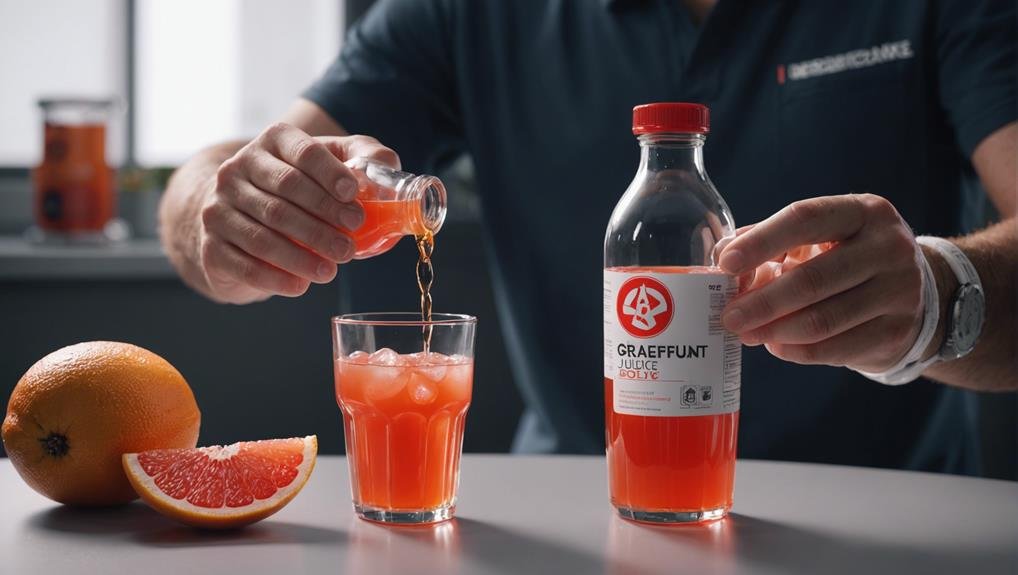Grapefruit Juice: Medication Interaction Alert
When taking medications, be cautious with grapefruit juice as it can alter how your body absorbs them. The chemicals in grapefruit can disturb enzymes, affecting medication effectiveness. Swap grapefruit juice for orange juice or meds less impacted by it. To prevent risky interactions, avoid consuming grapefruit juice with medications. Grapefruit inhibits an enzyme that processes drugs, so spacing out intake can help. High doses mixed with grapefruit juice can pose dangers. Safeguard your health by being mindful of these interactions. Explore strategies to minimize risks and guarantee your medications work as intended.
Key Takeaways
- Grapefruit juice inhibits intestinal enzymes affecting medication absorption.
- Even small amounts of grapefruit juice can impact medication effectiveness.
- Opt for orange juice or medications less affected by grapefruit juice.
- Space out medication and grapefruit juice consumption to reduce interactions.
- Consult healthcare providers for managing medications prone to grapefruit juice interactions.
Grapefruit Juice Interactions Overview
If you're taking medications, understanding how grapefruit juice can interact with them is vital for your health and safety. Grapefruit offers nutritional benefits, containing vitamin C, potassium, and dietary fiber. However, its interactions with medications can have significant health implications.
The chemicals in grapefruit, particularly furanocoumarin, can interfere with enzymes in your intestinal tract, affecting medication absorption. This interference can lead to increased blood levels of certain drugs, potentially causing harm. Even a small amount of grapefruit juice can impact medication effectiveness.
To minimize risks, consider switching to orange juice when on affected medications or choosing alternative drugs less affected by grapefruit juice. It's essential to avoid consuming grapefruit juice simultaneously with medications to prevent dangerous interactions.
Mechanism of Medication Interactions
Understanding the mechanism behind grapefruit juice's interactions with medications is key to managing potential risks to your health. Grapefruit contains compounds that inhibit the enzyme CYP3A4 in the intestinal tract. This inhibition can lead to reduced absorption of certain medications, causing them to reach elevated levels in your blood than intended.
Even a small amount of grapefruit juice can notably impact how your body processes these medications. Waiting between taking medication and consuming grapefruit juice can help lessen the interaction. It's important to be cautious, as high doses of medication combined with grapefruit juice can be dangerous.
Risk Mitigation Strategies
To mitigate the risk of potentially harmful interactions between grapefruit juice and medications, consider implementing proactive strategies. Dietary modifications play an essential role in managing these interactions. Opt for alternative citrus juices like orange juice if you're on medications affected by grapefruit juice.
Health implications of not addressing these interactions can lead to increased medication levels in your bloodstream, potentially causing adverse effects. Avoid consuming grapefruit juice at the same time as your medication, and space them apart to reduce the risk.
If possible, switch to medications that are less influenced by grapefruit juice to minimize the chance of interactions. By being mindful of these strategies, you can help safeguard your health and ensure the effectiveness of your medications.
Specific Medications to Watch
Identify medications that can potentially interact with grapefruit juice to guarantee safe and effective treatment. Certain drug categories are particularly susceptible to interactions with grapefruit juice, including statins (for cholesterol), calcium channel blockers (for blood pressure), benzodiazepines (for anxiety), and some immunosuppressants (for organ transplants).
Dosage management is essential when considering these medications, as grapefruit juice can elevate their blood levels, leading to adverse effects. It's important to consult with your healthcare provider to understand if any of your prescribed medications fall under these categories and to establish a plan to manage their intake in relation to grapefruit juice.
Taking proactive measures and being informed about potential interactions can help ensure the effectiveness of your treatment regimen.
Additional Considerations and Recommendations
For improved safety when consuming grapefruit juice with medications, consider these additional recommendations. It's important to be aware of the dietary implications of grapefruit juice interactions with medications.
Patient education plays an essential role in preventing adverse effects. Patients should be informed about the potential risks associated with combining grapefruit juice and certain medications.
Switching to alternative beverages like orange juice when on affected medications can help avoid interactions. Patients should also consider talking to their healthcare provider about switching to drugs that are less influenced by grapefruit juice.
Avoiding the simultaneous intake of medication and grapefruit juice is strongly recommended to prevent dangerous interactions. Being cautious, especially for men taking Viagra, is essential due to potential interactions with grapefruit juice.
Conclusion
To sum up, grapefruit juice may seem harmless, but its interactions with medications can be serious. Imagine a small glass of grapefruit juice morphing into a dangerous obstacle course for your treatment.
By understanding the mechanism behind these interactions and implementing risk mitigation strategies, you can navigate this potential hazard successfully.
Stay vigilant, stay informed, and prioritize your health by being mindful of the impact grapefruit juice can have on your medication regimen.







